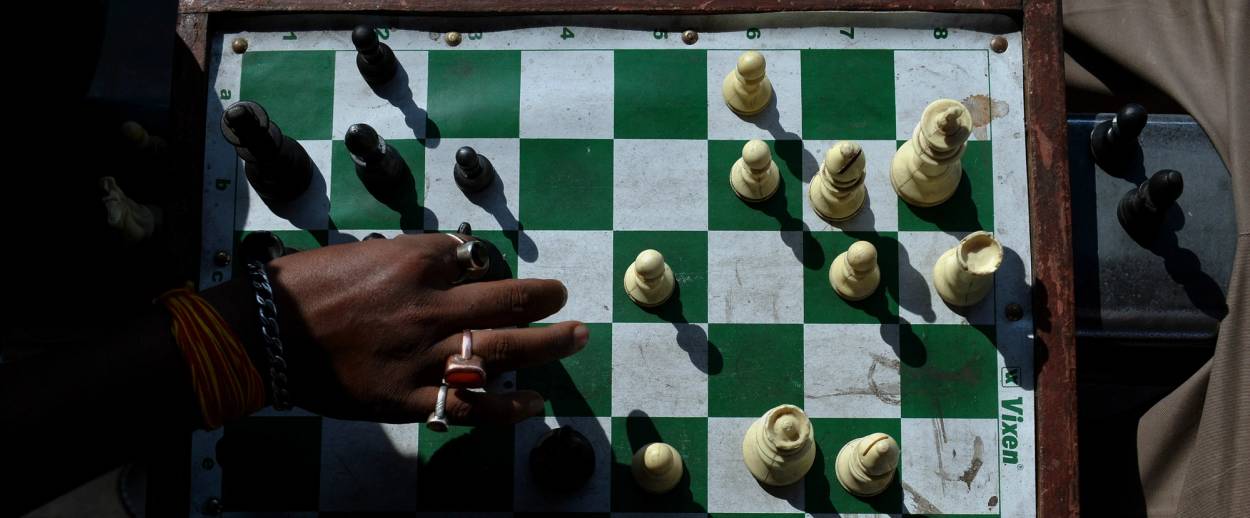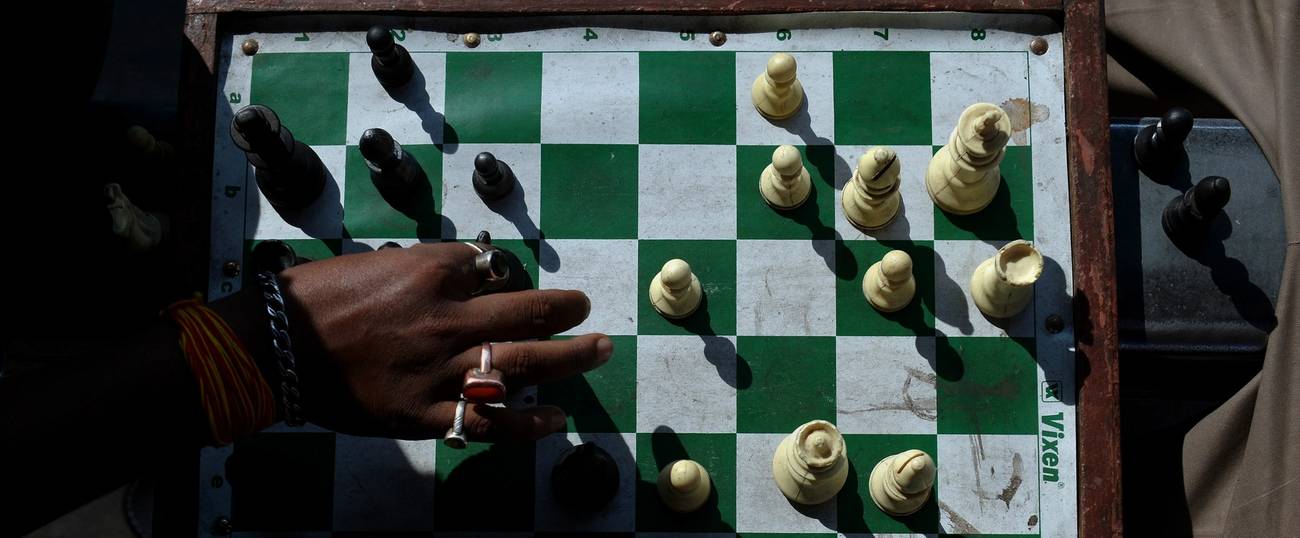Election Got You Bummed Out? Stressed? Play Some Chess.
Let the game of kings provide you with an ancient, soothing remedy: a deep and intimate engagement with people




What chess can offer everybody right now as we prepare—and, quite frankly, rub our eyes in continuous disbelief—for a Donald Trump presidency, is two-fold: a canvas upon which to project your emotions, and an opportunity to engage, with anybody, in dialogue.
If ever there were a boundless tapestry for the emotions boiling around in your bloodstream right now, it’s a chess board. It’s 64 squares of war—sometimes a slow and tedious victory, sometimes a coup, often a hard-fought battle, sometimes a draw. But it’s always, somehow, poetic, even in its most savage moments. Blunders happen, and pieces are left out to dry, hanging; queens, an army’s most powerful piece, are often trapped; kings aren’t killed so much as they are closed in on and left for dead; sacrifices, often, are the name of the game. It’s a bloody, bloody mess, but neat nonetheless.
Life, amirite.
* * *
I write this as we are hours away from the opening moves in the first world championship to hit the states since 1995, when Garry Kasparov defeated Vishy Anand on the 107th floor of the World Trade Center. But the return of chess competition at its highest level to the states, and in particular to New York, reminds me of Bobby Fischer, one of the best chess players in history, and without a doubt one of the top Americans to ever play the game (Paul Morphy and Wilhelm Steinitz, included).
Unfortunately, it’s easy to recall the Chicago-born Fischer for his idiosyncrasies, which morphed into a form of self-hating anti-Semitism and anti-Americanism in his later years. But let’s remember that Fischer, who died in 2008 in Iceland, the only country that would grant him asylum, was a boon to chess stateside and a positive influence on a new generation of chess players, after he defeated Boris Spassky of the former Soviet Union in 1972, at the height of the Cold War. Sales of chess sets soared and newspapers had columns dedicated to the game (which I consider a sport). This, of course, is no longer the case: Recently, the New York Times axed its chess column, which felt like a punch in the gut to those of us who enjoyed working its puzzles, and reading up on the masters of the game (not to mention a reminder of just how precious space has become in the pages of our most vaunted newsgathering organizations).
I wasn’t alive when Fischer won the title (which he famously never defended), but many people in my family were, namely, my uncle and grandfather, who have since died. But I cherish the countless afternoons we spent in parks and on porches playing the game together, pouring over chess theory together, sipping coffee together, smiling at each other. And I know that at some time, there was, and hopefully still is, chess in your life, somewhere.
Bring it back, hold it close.
Maybe you know how to play but don’t anymore. Or you do but you only play it on your phone. Put it down. At some point, someone showed you the ropes way back when—an ex during a romantic night in; your Floridian grandfather; a stranger in a hazy Yahoo! Chess room; an annoying sibling— but those lessons have faded and now you know those are the horses and can’t they jump? Yes, they can jump. And they can bring you joy.
Or perhaps the last time chess entered your mind was during a stroll through say, Manhattan’s Union Square, when you contemplated a professional chess swindler’s tricks, which are zero, because chess is chess and he or she sees what you see—64 squares and 32 pieces—just lots more, including your money. So you play, and you lose. But you walk away feeling riveted. Maybe you’re shaking because you were nervous and you just got your ass handed to you. Or maybe you were shaking because you know you were close to a victory if only. If only. Hold onto that hope. Try again. Fail, fail again. And again and again. It’s the battle that matters.
Chess is an ancient game of chance, a clean page on which to weave a personal narrative against an opponent who, on paper, comes to the impending blister of war with equal forces. To play chess at your best is to immerse, mind and body, and not give in from the opening onward. For an amateur the results of a match have no real repercussions except to provoke joy, regret, stress, deliberation, mercy, camaraderie, high blood pressure, pride and prejudice—an addictive psychological and physical journey. To feel alive.
And the more you play, the more you recall significant victories, like the time my pawn forked a bishop and rook—“forking” occurs when one piece attacks two or more, a potentially ruinous strike —and effectively completed a miraculous endgame comeback to earn a first-ever victory over my father, finally, at 23.
And the more you play, the more you recall significant defeats, like the time I came back against my uncle in Madison Square Park, and had him in a position to lose. But then I sacked my queen because my mind was elsewhere, and freaked out. I threw my hat on the ground. I cussed up a storm. Parents covered their children’s ears. And when I sat back down, my uncle gave me a look as if to say, you know better. And I did. Chess teaches decorum, and respect, and lessons in maturity. Respect your elders.
And the more you play, the more you recall more significant defeats, like, when I was 27-year-old Chess Wizard,= teaching the game to kids, and lost to a 4th grader within ten moves. For three years I dressed in a long black robe, checkered cape and Fantasia-like wizard cap, and toured the most magical cafeterias the public school systems of Chicago and Manhattan had to offer, spreading the gospel of the game of kings, a very special geometrical lingua franca that teaches youth—through a handshake—humility in the face of an explosively creative victory or a bruising, blunder-riddled defeat.
So dust off your chess sets and find someone to play. Teach them. Learn from them. Talk with them. Set up shop in a public park, or invite people over for a big roast beef and a few games of chess. Talk about the election and your emotions. Talk about Donald Trump, and Hillary Clinton, and Bernie Sanders, and Jill Stein, and David Duke, and what’s wrong. Let it all out. Talk about your similarities and your differences. Talk about your fears and your dreams. And let the game of chess govern your interactions, let it be the blanket that covers you.
Then put the board away and get what’s yours. Protest. Hit the streets. Look at yourself in the mirror. Look at others looking at themselves in the mirror. Write about it. Talk about it. Accept what is and work to make the world to resemble a better place.
Related: Bobby Fischer Vs. The Rebbe
Jonathan Zalman is a writer and teacher based in Brooklyn.